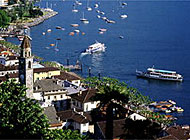Italian-speaking Ticino grapples with language threat

Switzerland's only Italian-speaking region of Ticino has a problem: German-speakers fuel the region's main industry, tourism, but they have also settled in such large numbers that the locals feel their language and culture is under threat.
The last national census in 1990 found that just under 10 per cent of the canton’s 300,000 inhabitants speak German. But there are pockets where the proportion is far higher.
Orselina, near Locarno, counts a German-speaking population of 45 per cent, while the figure in Ascona is 28 per cent and 25 per cent in Brissago. German-speakers have their own newspaper and, in some parts, their own priests.
The census also revealed that up to 40 per cent of people working in the services sector in Ticino say German is essential in the workplace.
Ticino’s Italian dialect has not escaped the trend unscathed. In 1978, 29 per cent of Ticinese school children said they spoke dialect together; by 1993, that figure had dropped to just six per cent.
Italian-speakers regularly complain in the letters columns of their newspapers that in some shops and public places they are addressed in German by fellow Ticinese. They also moan about the rise in property prices as a result of the influx of foreigners.
But there appears to be little the authorities can or want to do about the problem, not least because the economy is so dependent on German speakers.
It was Germans and German-speaking Swiss who brought prosperity to Ticino, after the Gotthard railway tunnel was opened in 1882. The tunnel suddenly brought the Italian-speaking region on the warmer south side of the Alps within easy reach of northern Switzerland.
The first to discover the region were the artists, dancers, writers, and thinkers who founded the Monte Verità movement. On a hilltop above the lakeside town of Ascona, they created a community whose back-to-nature philosophy struck a chord with many intellectuals in the German-speaking world.
Ascona has been a leading destination for Germans ever since.
“I think there is not a family here in Ascona that is not mixed with Swiss-German, German or Austrian people, so no family here speaks only Italian,” says Hetty Rogantini, whose father was a member of the Monte Verità commune.
“Everything changed as a result,” she said. “Religion changed, the culture changed, and life in general is different.”
Although the cultures and families are intertwined, there is still tension between German-speakers and Italian-speakers, and a certain amount of resentment towards the former when hordes of tourists take over the town in the high season.
Michel Poletti, director of Ascona’s San Materno theatre, says the tensions affects what he can put on. “If we present shows here in German, people don’t like them too much. There’s a reaction. The only audience would be the colony. Even when I invite musicians, if they come from Germany, it’s best not to publicise the fact too much.”
In the centre of the small town, Claudia Wilderer runs a German-Italian cultural centre and bookshop. She attempts to cater for both communities by organising cultural events in both languages, mainly outside the main tourist season.
She was born and bred in Ascona and married a German, but still finds it difficult to bridge the gap between the language groups. She says most of the locals grew up speaking German, but that few of the “immigrants” make the effort to learn Italian.
“Ascona is not a very young town and the older people, who are mainly German, stay together, because it’s not easy to learn a new language. We try to put the people together, but it’s not so easy. There are two mentalities and two kinds of temperament.”
She is also unhappy at how the town has changed to accommodate wealthy residents and tourists. Exclusive boutiques and expensive restaurants dominate the town centre, an evolution Wilderer calls the “Monte Carlo look”.
She says many locals feel alienated by the development.
“I think we made a big mistake in changing so much to pretend to be something we are not. Usually we are very simple and shy people.”
by Malcolm Shearmur

In compliance with the JTI standards
More: SWI swissinfo.ch certified by the Journalism Trust Initiative
You can find an overview of ongoing debates with our journalists here. Please join us!
If you want to start a conversation about a topic raised in this article or want to report factual errors, email us at english@swissinfo.ch.